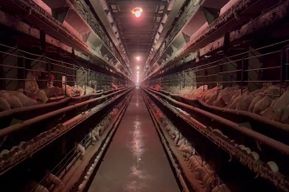
We have 30 days to take on Goliath – again
November 12, 2025
November 10, 2020
In April 2019, Beyond Meat was imported into Russia, sparking the first wave of interest in plant-based meat from the food-service and retail industries. Almost immediately at least five meat producers launched their own range of similar plant-based alternatives. Then, the second wave of interest hit the Russian market in late summer and early autumn of 2020. This is the story of how it happened.
In September, the EFCO Group, one of the leading Russian producers of yoghurts, mayonnaise and oils, introduced new products — plant-based patties and cutlets (which can be used as part of a traditional Russian dish made with minced meat and onion, garlic and herbs). The company announced that this decision was made because they wanted to follow the latest trends in the food industry, and introducing plant-based alternatives would be the best way of doing so. The first stage of EFCO’s investment in the production of the new products amounts to approximately $1.3 million. Within the next three years the company plans to increase this number to $50 million and build a separate plant for alternatives to meat and dairy products. Excitingly, we’re told that even more new products will be arriving from EFCO soon.
Alexei Ivanov, the Project Coordinator for Eating Better, visited the launch event and found that the new EFCO burger patties were as good as those produced by Beyond Meat.

Representatives of several restaurant chains also gave positive feedback on the new patties and cutlets. The founder of Teremok, one of the largest fast food chains in Russia, posted several videos on Facebook just after the presentation with his comments on how good it is that food of the future is coming into our homes.
Plant-based dumplings
Greenwise also presented new products. The company entered the market in mid-2019 and now, a year later, its products can be found in more than 1600 shops — not only in Russia but also in Belarus, Kazakhstan and Latvia. Originally Greenwise only offered jerk chicken and strips, but new plant-based chicken pieces and minced meat will soon be appearing on the shelves of several supermarket chains. Chicken meat and minced meat dumplings are very popular in Russia, so the introduction of plant-based alternatives to such products could be very important for reducing meat consumption in the country.

100 tonnes per month
Kotletar — a factory in the small Russian town of Kostroma — has been producing meat products for 23 years, but a few months ago the company revealed its interest in plant-based alternatives. Kotletar is by no means the largest meat producer in Russia, but even at its current size, it has the potential to produce up to 100 tonnes of plant-based products per month. Over the next few months, the company is going to launch vegan cutlets in 1100 stores belonging to Russia’s popular supermarket chain, Vkusville. Kotletar also plans to start producing dumplings, nuggets and minced meat. These products are currently in the flavour development stage.
Specialists in Kotletar responded with interest to our guide for plant-based meat producers.We are now working with them to further improve the flavour of their products. Alexei was recently invited to their plant; he enjoyed seeing how traditional meat production is transitioning towards a better future for animals, for the planet and for all of us.

Welldone
At the end of September we received some exciting news — another mayonnaise producer had launched a new plant-based meat brand. The product, under the name Welldone, appeared in 20 restaurants and cafes in Moscow, and is already being used by some of the best chefs in town. What’s more, they’re using it as a part of their regular, non-vegan menus.
Welldone is going to be sold in supermarkets, too. And the new product’s significance does not end here: the Aintrigud Foundation, which was established by Ivan Sidorok, co-owner of the Nizhny Novgorod butter and fat plant, invested heavily in the new product’s development.
In mid-October we were invited to give a presentation at the Russian Meat & Food Industry Conference 2020, where numerous representatives of meat companies were also present. Alexei talked about the future of plant-based alternatives, and also about the important group of consumers who are not going to give up meat completely, but are interested in reducing their consumption. According to our recent study, 54% of Russians are ready to start including plant-based products into their diet.
Looking forward
Despite the significant increase in interest for plant-based products over the past years, all the alternatives put together currently account for less than 1% of the total Russian meat market.
Although the culture of reducing meat consumption in Russia is not as well developed as in Europe and the United States, the increasing number of traditional producers who have started selling plant-based food gives us hope that this may already be changing. We are looking to hear more exciting news - and to keep working to help to make plant-based products in Russia accessible, attractive and really delicious.